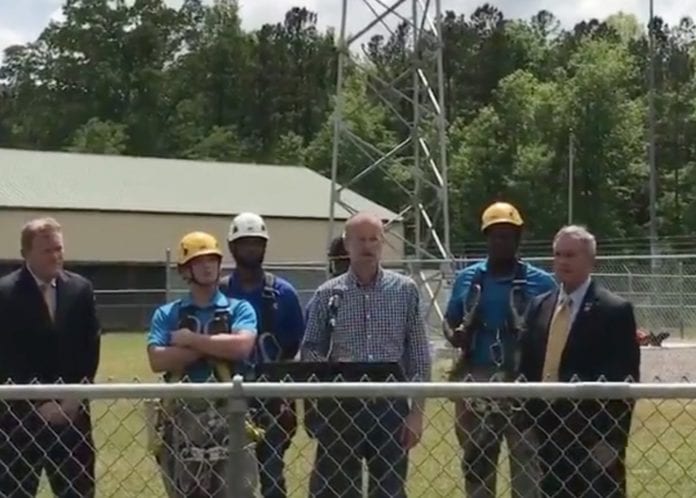5G will support 22 million jobs by 2035, researchers say
Brendon Carr, a commissioner on the U.S. Federal Communications Commission, sees community colleges as key to developing the workforce needed to efficiently deploy 5G in the U.S. And, according to remarks he made last week, he’s working with the National Wireless Safety Alliance to establish training programs for future telecom tower technicians (TTT-1), a designation and certification developed by the safety group.
Last week Carr visited Aiken Technical College in Graniteville, South Carolina, which hosts the seven-week Tower Installation Program–a practical and classroom-based regimen focused on telecom workforce development.
Carr said the domestic 5G roll out will require 20,000 new “skilled workers,” based on estimates from wireless workers.
“It’s time we build on the success here at Aiken and stand up similar tower training programs in community colleges and technical schools throughout the U.S.,” Carr said. “Doing so will address our country’s need for more TTT-1 certified workers and help close the skills gap by turning our country’s community colleges into pipelines for 5G jobs. “
The TTT-1 certification is a non-supervisory certification described by NWSA as “for crew members who perform general construction activities with an emphasis on tower system installation, modification, maintenance, and inspection of support structures used in telecommunications, including personal wireless communications, public safety communications, utility networks, and broadcast.”
In the larger context of 5G-related job creation, a report commissioned by Qualcomm and conducted by IHS Markit, Penn Schoen Berland,
and Berkeley Research Group estimates that by 2035 5G will support 22 million jobs. Further, the next-generation of cellular “could produce up to $12.3 trillion worth of goods and services [by 2035]…In that same timeframe, the global 5G mobile value chain alone will generate up to $3.5 trillion of economic output.”
In a series of tweets, Carr said every student that has gone through Aiken’s program has gotten a job offer. “And by establishing these programs at community colleges, it opens up access to Pell Grants and tuition assistance for vets, thus creating a pipeline to good-paying 5G jobs.”
He also noted that “nearly every” tower construction company is a small business with between 10 and 15 employees. “So creating a larger pool of TTT-1 certified tower climbers through community college programs can address workforce challenges while promoting the safe build of next-gen infrastructure.”

